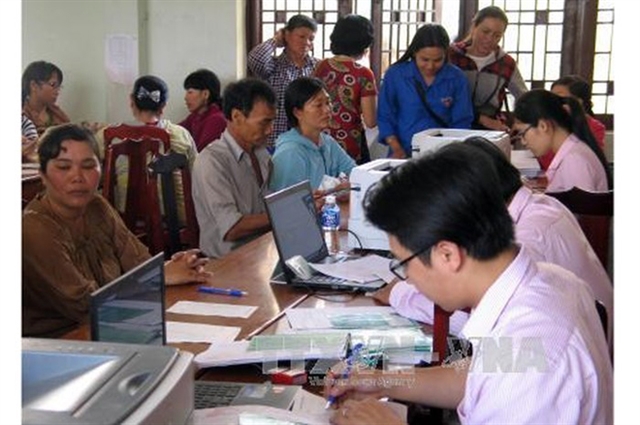 Society
Society

Thanks to a number of support policies at the local level, hundreds of disadvantaged labourers in the country will have more opportunities to work abroad this year.

|
| Disadvantaged labourers who want to work abroad are provided soft loans and consulting services. — VNA/VNS Photo Công Thử |
HCM CITY — Thanks to a number of support policies at the local level, hundreds of disadvantaged labourers in the country will have more opportunities to work abroad this year.
The Mekong Delta province of Trà Vinh, for example, has targeted sending about 900 labourers to work abroad under contracts next year.
Dương Quang Ngọc, deputy director of the provincial Department of Labour, Invalids and Social Affairs, said the province had issued a number of policies to support local workers going abroad.
“Supporting labour export activity is part of the province’s efforts to reduce poverty,” he said.
Those who want to work abroad can access soft loans from the Việt Nam Bank for Social Policies - Trà Vinh Branch, with a maximum amount of VNĐ150 million (US$6,450).
Payment will be made for part of the fees for vocational training courses, foreign language courses, expenses for meals during study, and administrative procedures that need to be completed (criminal records, passports and medical examinations).
The department has introduced reputable labour-export companies and relevant agencies to labourers, and has worked closely with labour-export companies to protect the legal rights of labourers working abroad.
“The labourers will be given support to deal with risks and difficulties while working abroad,” Ngọc said.
The provincial Employment Service Centre has organised many seminars to provide necessary information related to labour exports.
Last year, over 600 local residents were sent to work abroad, reaching 173 per cent of last year’s target. Of the figure, more than 530 people were sent to Japan.
“People working abroad have higher incomes and better working conditions,” Ngọc said. As a result, the lives of their families have improved significantly.
An unskilled Vietnamese labourer working in Japan can earn an average monthly income of VNĐ28-30 million ($1,205-1,295), while a skilled or highly-skilled labourer can earn VNĐ37million ($1,595) per month.
Moreover, after completing their contracts and returning home, labourers working abroad can be hired at foreign-invested companies with high salaries.
In the south-central province of Ninh Thuận, the number of labourers sent abroad has increased in recent years.
The province has provided labourers with information related to labour markets and labour export requirements, loans, and vocational training.
This was the third consecutive year that the number of guest workers exceeded the province’s targets, Trần Văn Trưa, deputy director of the provincial Department of Labour, Invalids and Social Affairs, said.
Last year, the province sent 210 people abroad, surpassing the year’s plan by 40 per cent.
Local authorities opened many job fairs and consulted candidates who wanted to work overseas, offering opportunities to 2,500 local job seekers. It also created jobs for over 17,100 labourers last year.
Japan, South Korea, Saudi Arabia, Germany and Russia are among the province’s major labour export markets with preferential policies from governments, good working conditions, and high incomes.
Labourers overseas have been working mainly in construction, assembly of electronic products, textiles and garments, leather shoes, domestic work and agricultural work.
“Most of our labourers have stable incomes,” Trưa said.
Many labourers sent money to their families and relatives for expanding production scale, building new houses, and buying new household appliances, he said.
They earned an average monthly income of VNĐ28-30 million ($1,205-1,295) in Japan and South Korea.
After covering all living expenses, a female labourer doing domestic work in Saudi Arabia can save VNĐ9-11 million ($390-475) each month.
Work abroad has helped reduce the poverty rate and contributed to the province's socio-economic development.
“However, the number of labourers going to work abroad hasn't been commensurate with the province’s potential,” Trưa said.
Many labourers seek opportunities to work abroad but they are weak in foreign languages, lack skills and knowledge about laws and customs in other countries, and face financial difficulties, he said.
To overcome these problems, the provincial authority has asked agencies to regularly update all information related to labour export companies and labour export markets.
Consultation is provided for people interested in overseas jobs to help them know their rights and obligations, as well as laws, procedures, and incentive policies.
The Việt Nam Bank for Social Policies in Ninh Thuận Province said it would continue to grant VNĐ2 billion ($86,520) in soft loans every year to needy people who want to work abroad.
The soft loans are provided to poor and near-poor people, ethnic minority people, relatives of people who have provided meritorious service to the revolution, and people who have completed their military services.
The province has also sought more potential labour export markets and focused on markets looking for high-skilled labourers with high incomes.
About 500,000 Vietnamese are working in more than 40 countries and territories worldwide, according to figures from the Department of Overseas Labour under the Ministry of Labour, Invalids and Social Affairs (MOLISA).
In the 2017-20 period, MOLISA expects to send about 100,000-120,000 labourers to work abroad each year, including 80 per cent of them as trained labourers. — VNS




